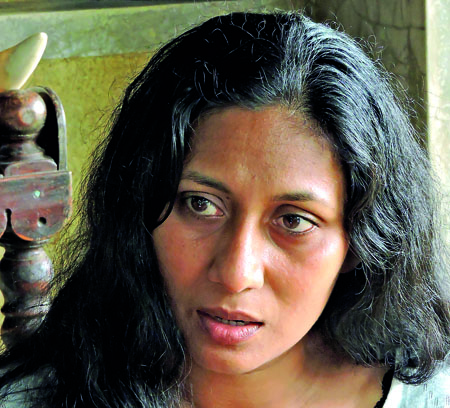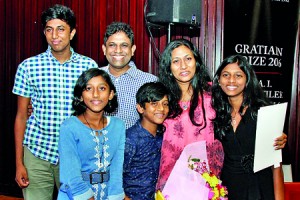Stories without frills
Behind Charulatha Abeysekara Thewarathanthri’s house on the outskirts of Colombo, are fields heavy with overgrown greenery blotting the canal beyond. A stray dog named Rex confidently ambles through the house to ensure that all is well (“He thinks he belongs to us”) and makes a polite exit. Charulatha points out a maara tree her children have named Catherine and carry on conversations with. There’s also a pair of crows the children have christened Martha and Jacob, but they aren’t here today.

Charulatha: Focus on the story. Pic by Athula Devapriya
This vein of whimsy contains echoes of Charulatha’s own childhood experiences — as a child she used to wander through her aunt’s estate in Ruwanwella, deliberately getting lost amidst the whispering rubber trees – and spills over into the pages of her novel Stories which won the 2016 Gratiaen Prize last week.
Stories begins with a dream dreamt by Cheran, a young Tamil university student in the UK. Cheran is dating Liz, a Scottish girl who spent parts of her childhood in Sri Lanka. He finds himself disconcertingly flitting from strange dreams to stranger realities. The couple journey to Sri Lanka to find answers for these series of strange events and start piecing together the story of Muthu. Unwittingly, Cheran finds himself being a part of the story.
Muthu, the offspring of a Sinhalese mother and Scottish father, is born in Sri Lanka. After her mother dies, her grief-stricken Scottish father retreats to his country. Muthu is brought up by her Sinhalese relatives and the blue-eyed, copper-haired child becomes a strange fixture in Ratnapura.
Prof. Sasanka Perera, Chair of this year’s judging panel for the Gratiaen Prize commented on the non-linearity and layered nature of the novel. “It [Stories] moves from the seemingly normal to the surreal. In general, it reads well and manages to retain the interest of readers,” he noted via email, adding that its narrative potential could improve with creative and robust engagement with specific places, contexts, conversations and histories.
Stories is formed with nuggets of little stories which make up a big picture. “Stories,” Charulatha writes, “is not a children’s book. Simply because not everything that happens to a child is ‘child-friendly’.”A child’s perception of reality, fantasy and the occult collide in the chapters and the novel hopscotches through the past and present, connecting the stories. For Stories, Charulatha embarked on research on adulthood, the ’83 riots with a focus on what unfolded in Ratnapura during the riots. The location and timeframe is deliberately chosen because it overlaps with her own childhood. “Those were the most realistic images and memories of childhood that I had. The holidays spent in my own Loku Ammi’s estate in Ruwanwella – I swear the rubber trees used to speak to me,” she laughs. “I used to wander so much and would never come home before sundown.”
With parents who were avid readers and writers and a house filled with books, reading and writingwasan innate part of Charulatha’s childhood.

Shared joy: Charulatha with her family at the Gratiaen ceremony. Pic by Indika Handuwala
“I started reading at a very early stage. I was reading things like Madol Duwa by the time I was six or seven,” she explains. “Another thing my parents did was to show me the similarities between Sinhala and English literature and how they evolved. So it was not a formal learning – I haven’t had any formal learning in English other than my O. Levels. But whatever I know, I learned from talking to my parents, reading the books they had around them and looking at them write, reading what they wrote and just trying my hand at it.”
While her early childhood poems were in English, her private journals were written in Sinhala, a language that is close to her heart. “I just love the language. I love the way it flows so smoothly. For some reason, I find it so self-satisfying to write in it. I love how ancient it is, how one word can mean so many different things in different contexts. I love that about it. It shows how rich it is,” she explains. “English and Sinhala were both part of the home culture. I was never allowed to be lax with one language.” Her mother played an important role in tending to her Sinhala reading and writing, while her father inculcated an appreciation for the English language.
Although Stories is Charulatha’s first Gratiaen win, she is no stranger to the prize – an unpublished novel Autumn Leaves was shortlisted in 2012. Autumn Leaves dealt with a story about a father and daughter and was written as a way of contending with the death of her father – director, writer and critic Tissa Abeysekara. Charulatha admits that the writing of her first book changed her process for the second.
“In the first one, I was letting myself go completely. I started writing an emotional account of Thaaththi and me,” she muses, reflecting that the story got lost in the descriptions and the emotions. When writing Stories, an anecdote her father shared with her about the force of simple but powerful writing stuck with her throughout.
“I remembered something my Thaaththi used to say. My parents used to be in the same classroom in Dharmapala College in Pannipitiya. There was a new English master in the class and he had asked them to write about a topic. My father had been the star English student in class and he had written it using the biggest words and sentences he could find and given it in very confidently,” reminisces Charulatha. “By the time it came for the essays to be read out, the master started reading from the best first. My father had expected his essay to be at the top as usual. But it wasn’t at the top, neither was it the second one or the third one. He waited and waited only to find his was the last essay.”
The master summoned a disappointed Tissa Abeysekara and asked him to rewrite one of the first sentences in the Bible (‘And God said, “Let there be light,” and there was light’) in simpler English.
“And my father hadn’t been able to. No one can, it’s as simple as it can get as a sentence and it’s so pure and beautiful and it conveys what it wants to convey without the frills and the ornaments around it. So I kind of had that at the back of my mind when I wrote Stories. I thought ‘let me cut
down on the frills and convey the story as much as I can’,” she says.
The timing of her win is particularly bittersweet. In her acceptance speech at the Gratiaen award ceremony, she noted that her father himself had won the Gratiaen Prize for Bringing Tony Home exactly 20 years ago.
Now that the excitement of the Gratiaen has settled, what’s next? Charulatha explains that she will be taking on the edits and publication of Stories over the next year – no easy task. Her Gratiaen win has also given her the confidence to dust out her Sinhala writings over the years and perhaps even start writing more in Sinhala — “I used to think my Sinhala is better than my English. Now I’m not so sure,” she explains, mulling over her plans for the future. “I’ll just have to wait to see what comes along.”


